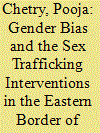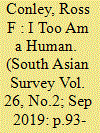| Srl | Item |
| 1 |
ID:
167405


|
|
|
|
|
| Summary/Abstract |
The present article looks at gender bias and sex trafficking interventions in the eastern border of India–Nepal. It attempts to understand the socio-economic conditions and other influencing factors that circumscribe a woman’s migration. It documents the interventions by anti-trafficking networks and explores the experience of intercepted women. It attempts to show how interception methods as techniques of intervention to combat trafficking in persons are gender biased. Interception, as a primary method of intervention, is used by anti-trafficking organisations to prevent the occurrence of human trafficking cases in its origin/source country. On suspicion, a woman or a girl crossing the border alone or in all-female groups is stopped and intercepted by the anti-trafficking activists on the ground of her being a potential victim of sex trafficking. Such interception generally takes place within 3 km radius of the border of Panitanki, India, to Kakarbitta, Nepal in order to prevent the unsafe and illegal migration of girls/women. The cross-questioning method is used to extract information and validation about her identity and travel. This article, therefore, examines interception methods as techniques of intervention to combat trafficking in persons. It shows how this intervention method in certain aspect is patriarchal in its form. It reinforces the patriarchal belief of women’s vulnerability in the absence of male authority leading to discreet dangers.
|
|
|
|
|
|
|
|
|
|
|
|
|
|
|
|
| 2 |
ID:
167404


|
|
|
|
|
| Summary/Abstract |
This study explores the political psychology of General Pervez Musharraf, Pakistan’s most recent military dictator. It categorises his ‘operational code’—a collection of general political beliefs assessed from spoken and/or written statements—over four periods of his nine years of power.
|
|
|
|
|
|
|
|
|
|
|
|
|
|
|
|
| 3 |
ID:
167406


|
|
|
|
|
| Summary/Abstract |
Regional governance efforts in South Asia have been missing regional political institutions. There is no shortage of ideas and suggestions by scholars, practitioners, diplomats and others in terms of areas for integration in South Asia. And yet, regional integration continues in a piecemeal like stuttering fashion. Integration lags not because there are questions about the efficacy of regional integration or questions about where or what to integrate, it lags because of the path forward—in terms of how—is unclear. Regional or sub-regional political institutions vested with the decision-making authority can aid in integration better than the status quo. Political institutions in contrast to forums or summit-convening authorities can make decisions of their own benefiting the interests of those whom they represent. This article examines the current state of regional governance efforts in South Asia and evaluates the argument for regional and sub-regional political institutions.
|
|
|
|
|
|
|
|
|
|
|
|
|
|
|
|